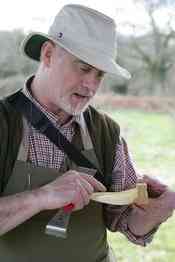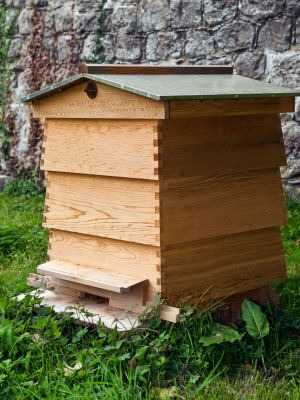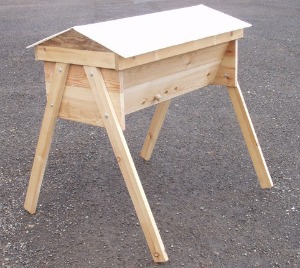Phil Chandler - The Barefoot Beekeeper Talks About Beekeeping And
Learning From Bees
If you have visited several of my beekeeping pages, you may have come across these videos, most of them featuring Phil Chandler, author of The Barefoot Beekeeper.
Phil is well-known in beekeeping, as an advocate of bee-friendly (or api-centric) beekeeping practice and natural beekeeping.
Phil has written a new book – Learning from Bees. I caught up with Phil to ask him a few questions…..
Q&A With Phil Chandler
BuzzAboutBees: What made you decide to write another book and how is this one different from the last?
 Phil Chandler.
Phil Chandler.Phil Chandler: I wrote The Barefoot Beekeeper to challenge the status quo and propose a method of beekeeping that is both bee- and beekeeper-friendly: it is much less invasive for bees and doesn't require the beekeeper to be a weightlifter. My recent book, Learning From Bees, is more reflective - a collection of some of my thoughts about bees and beekeeping.
BuzzAboutBees:
How long have you kept bees? Can
you tell us a bit about your overall beekeeping experience? I understand
it includes time spent at the famous Buckfast Abbey, England?
 Above: A WBC hive - the type of hive Phil first started beekeeping with.
Above: A WBC hive - the type of hive Phil first started beekeeping with.Phil Chandler: I started in 2000 with a couple of WBC hives - the type you see a lot in children's books, with stacked, sloped-sided sections - and couldn't understand why it was necessary to use such complicated equipment and invasive methods to keep bees.
I began to investigate other hives and experimented with my own designs, eventually settling on a modified Kenyan-style top bar hive, which is still my favourite.
About five years later, I worked for a year at Buckfast Abbey to gain some practical experience of commercial beekeeping, which is not something I would want to do again.
BuzzAboutBees: You are not only an author, you are also a teacher and speaker, and have appeared on TV a few times. You’ve set up Friends Of The Bees and Bee Friendly Zones. Now I understand you are hob-knobbing with the Royals. What’s all that about?
Phil Chandler: I have been invited to teach at Highgrove, home of the Prince of Wales and the Duchess of Cornwall, which is quite an honour. We are offering a four-day course, spread over the beekeeping season, it started March 15th.
BuzzAboutBees: Have your beekeeping practices changed significantly over the years, and if so, how?
Phil
Chandler: Not much has changed - only
refinements here and there - but I have virtually stopped using any treatments
for Varroa. We need to allow bees to learn to deal with pests and not rely on
medications - mostly this is about creating an environment inside the hive that
they can control.
BuzzAboutBees:
Which species of honey bee have you
kept, and which do you prefer nowadays and why?
Phil Chandler: All bees in my area are mongrels and because I rely on swarms to replace losses I just work with what turns up. Some are well adapted to local conditions and survive, while some do less well. When I was at the Abbey, there were still some true Buckfast colonies left, which were a pleasure to work with, but they don't breed true in the wild and out-crosses are often vicious, so there is always an element of unpredictability in our bees' temperament.
I would love to see the old British black bee make a comeback, but that would require the co-operation of a large number of beekeepers - which would be rather like herding cats.
BuzzAboutBees: What is your most important bit of advice for new beekeepers?
Phil Chandler: Do some reading and decide why and how you want to keep bees before buying anything.
Get some hands-on experience to make sure you are temperamentally suited to keeping bees.
If your main motivation is providing a home for bees with some honey for family and friends, then a top bar hive will do the job and save you a good deal of money - especially if you can build your own top bar hive.

BuzzAboutBees.net is a member of the Amazon Associates Program.
As an Amazon Associate I earn from qualifying purchases if you click on a link from my website to an Amazon website page. I only recommend books and goods I myself like. Further information, see: Advertising And Affiliates Disclosure.
If you found this page helpful or interesting, I'd really be grateful if you would share it with others - if not this page, perhaps another, such as Gardening For Bees.
Thank you so much :) .

